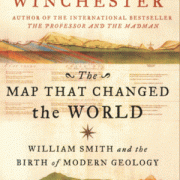Follow this link for the Plate Tectonics Pre-Workshop Common Read questions
Workshop Preparation
 |
Read: The Map that Changed the World, by Simon Winchester Answer: Follow this link for the Plate Tectonics Pre-Workshop Common Read questions Review: Reader’s Notes & Additional Glossary of Terms and Discussion Questions (see below) |
Course Objectives
Workshop Description
This workshop will help educators plan and deliver a range of classroom activities that are age-appropriate and accessible for many audiences, and that provide an integrated view of the processes that form and modify our planet. This integrated plate tectonics framework provides meaningful structure to support all activities in any subfield of Earth Science.
Science Content
- Acquire a deep understanding of science content being taught
- Know and understand the science standards for their grade band
- Understand what content is appropriate for students at grade levels
- Understand central concepts rather than isolated facts
- Identify individual learning targets embedded in the big ideas
- Recognize the appropriate sequence of targets (learning progression) and order of concepts that students must experience for a big idea.
Designing Instruction for Understanding
- Understand common student misconceptions about a science concept
- Know and understand the science standards for a teacher’s grade band
- Identify individual learning targets embedded in the big ideas
- Know assessment strategies for eliciting evidence
- Know how to engage students in inquiry to develop understanding of science concepts and the nature of science
- Know how to access and manipulate authentic data from national databases
Sense-Making
- Know the learning targets for a science activity
- Know the sequence of targets (learning progression) that students will experience (for a given science activity)
- Know how to get students to make sense of what they are learning
- Know how and when to provide time for students to make sense of what they are learning
- Know strategies for students to engage in thinking about their learning and how it has changed over time
Classroom Culture and Environment
- Know what evidence exists which supports full access to science for all students
- Understand students’ interests, background, strengths, and challenges
- Know how scientists work and that science is a social enterprise
- Know how to foster a collaborative learning environment
- Understand both intrinsic and extrinsic motivation
- Understand strategies for engaging students



